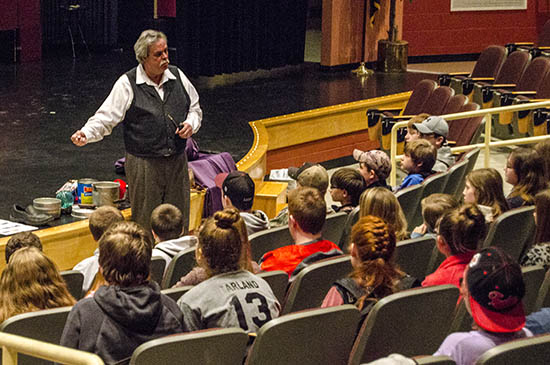Mountain storyteller adds coda to substance abuse prevention lesson
Mountain storyteller adds coda to substance abuse prevention lesson

In the first row, a young boy sat, round brown eyes glued to the presenter who paced a few feet in front of him. His gaze never wavered. The message he was listening to seemed to be sinking in.
That’s what Steven Hollen was aiming for. Hollen, a storyteller with a musical, rolling accent that reflects the Eastern Kentucky hills in which he grew up, recently reached out to the seventh and eighth graders in Elliott County Middle School with one very important message: everyone in that room mattered.
“I am somebody,” the students repeated after him.
“Louder. Mean it,” Hollen exhorted them.
“I am somebody!” rolled back at him, louder this time.
“Really mean it!”
“I AM SOMEBODY!”
This wasn’t just an exercise in self-identity. Hollen’s visit was designed as a follow-up to the University of Kentucky Cooperative Extension’s substance abuse prevention program, Truth and Consequences: The Choice is Yours, in which the students participated last fall. The program teaches students about the consequences they will face if they make the choice to use and abuse alcohol or drugs.
Truth and Consequences is different from many substance abuse prevention programs in that it involves community members, including judges, police officers, emergency personnel, teachers and parents.
“Whether you have to confront your principal, or whether you have to be taken to jail in the back of a state police car, they experience what it’s like to go through that,” said Gwenda Johnson, Elliott County family and consumer sciences extension educator.
Elliott County’s version of the program also included a “death scene,” where a volunteer student played the part of someone who has died from an overdose. Whereas some of the students treated the scenarios a little lightly at the beginning, Johnson said, the tone quickly changed when they saw what really could happen.
“I think the death scene from an overdose of one of their peers really brought it home and made them think, hey, this can happen. Then they were very serious,” she said.
Nicole Peritore, UK senior extension specialist in family and consumer sciences, believes the strength of the program lies in the community’s involvement.
“Because drug and alcohol use is typically seen as a community-wide issue, it takes community awareness and action to actually improve those statistics,” she said. “This program offers the opportunity for parents to come and be with their children as they’re going through a scenario. It really creates awareness, which is the first step to taking action to reduce the incidence of alcohol and drug use and abuse.”
Keith Center, the county’s agriculture and natural resources extension agent, said that the community truly bought into the program.
“We had a lot of positive feedback and numerous people saying this was something they wanted to see in the school system every single year,” he said. “What made it unique was the parents of the child that played in the death scene were there and played that role. There were times I had goose bumps and had to walk out of the gymnasium because it really touched home. It wasn’t just role play; it became real.”
Because it was so real, Johnson wanted to have a follow-up exercise that was a bit lighter. With funding from Operation UNITE, the goal of which is to develop and empower community coalitions to no longer accept or tolerate the drug culture, Johnson was able to bring Hollen in for a special presentation for the middle schoolers.
“We wanted something that brought that message, but in a way where everything isn’t doom-and-gloom,” she said.
Hollen was anything but that, as he spoke to the students about who they are. He told them he had grown up in Clay County, part of a family that has been in Appalachia since 1760. He told them he was the first person in his family to graduate from high school and then college. Using stories from his own experiences, he encouraged them to take pride in their home, in their region and in themselves.
“There are three reasons why you guys are going to do drugs or drink,” he told them. “Know what they are?”
As the students responded, he ticked them off on his fingers. Depression. Excitement. Peer pressure.
Then he passed out clear, glass marbles, pronouncing them crystal balls in which they could see their futures.
“How many of you can see yourself in 15 years homeless and on crack, living in a box?” he asked them. “Look in your crystal ball again and think about where you want to be in your late 20s, early 30s.”
The students saw spouses and children and careers.
“There’s nothing I can say that will convince you not to do drugs,” Hollen told them. “Nothing is going to stop you except you. You have a choice every day to be somebody.”
Events Extension Family Consumer Sciences


